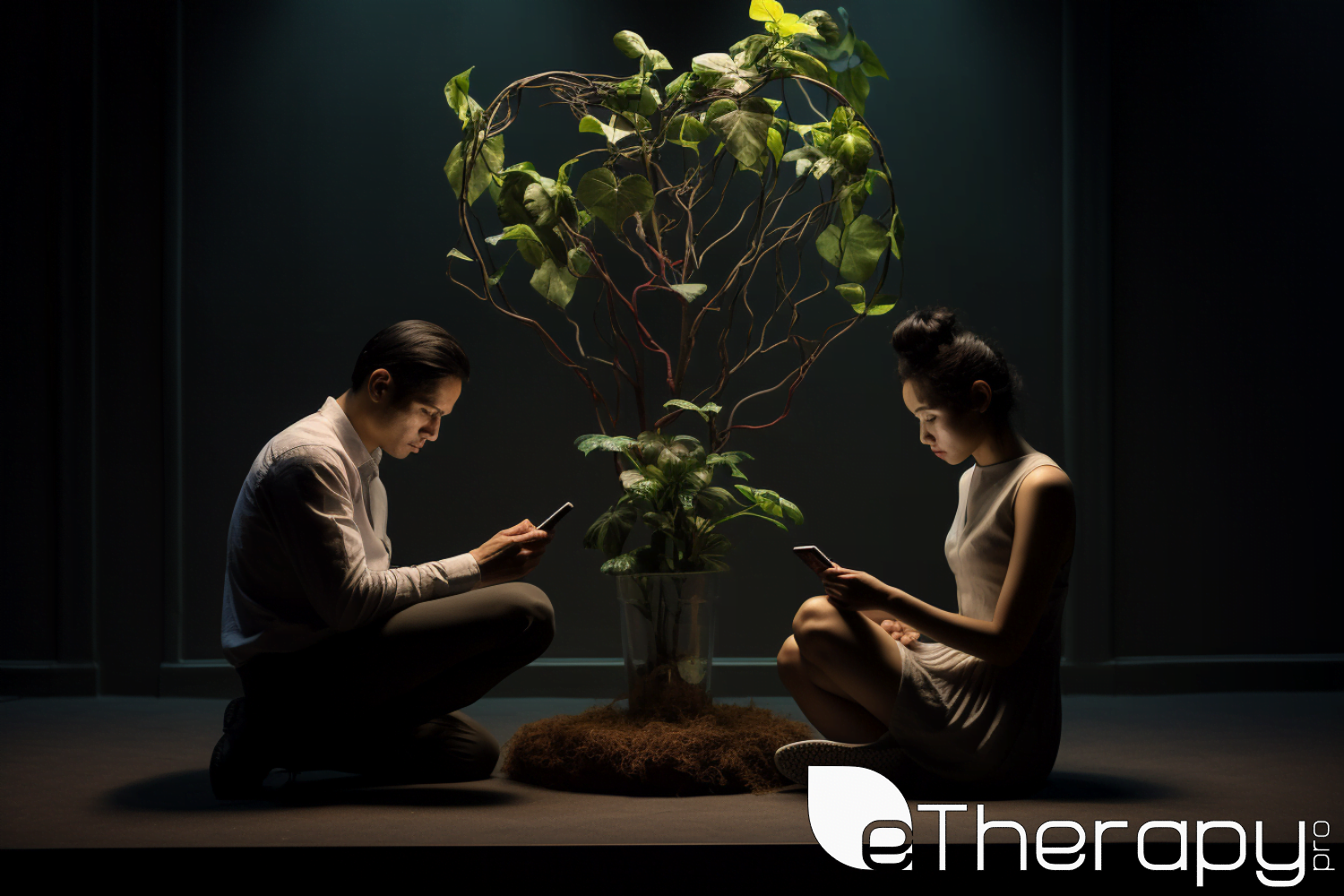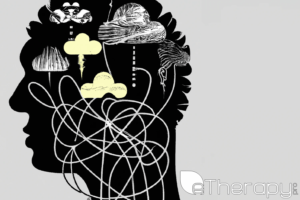
Have you ever found yourself mindlessly scrolling through your partner’s social media, feeling a pang of jealousy or insecurity from the smallest of interactions they’ve had online? Or maybe you’ve caught yourself constantly checking your posts, waiting for that ‘like’ from someone specific. Welcome to the age of social media and relationships, where online interactions can bring about real-world emotions.
The constant search for attention through social media seems to reinforce the idea that the world revolves around individuals, amplifying narcissistic tendencies. – Dr. Jean Twenge, author of “Generation Me”
Dr. Twenge’s observation underscores a significant concern of our digital age. The continuous stream of likes, shares, and comments can inadvertently feed into a person’s self-centeredness. While it’s essential to find validation and connection, the disproportionate emphasis on online affirmation can skew perceptions and potentially harm the depth and quality of real-world relationships.
In this journey, we’ll delve deep into the intricacies of love, trust, and commitment in the age of Instagram, Facebook, Twitter, and TikTok. We’ll explore questions like: What does online infidelity look like? How has the pursuit of validation through likes and comments affected our self-worth? And what can be done to nurture and protect relationships amidst these digital challenges? So, whether you’re in a relationship or single and mingling online, come along as we navigate the world of love in the digital era.
Social Media and Relationships: Embracing Relationships in the Digital Age
Once upon a time, love stories unfolded through candlelit dinners, whispered secrets, and moonlit strolls. Today, our romantic narratives are interwoven with emojis, GIFs, and DMs. Although the digital realm has reshaped relationships, it has also opened doors to new, exciting possibilities. Let’s traverse this digital love landscape, acknowledging its gifts and grappling with its challenges.
Social Media And Relationships: The Digital Bridge to Hearts Everywhere
Our world, vast and sprawling, seems cozier when a message can traverse continents in seconds. Dating apps introduce us to potential partners outside our local coffee shops, and video calls bridge miles to pull long-distance couples close.
A World Without Borders
The digital realm dissolves physical boundaries, letting connections blossom in the most unexpected of places. A small chat window can be the birthplace of a profound connection, leading to lifelong partnerships or friendships.
The Illusion of Constant Availability
Yet, with this ease comes the expectation of always being ‘online’ and available, which can strain relationships. Being constantly reachable can sometimes feel more like a leash than liberty.
Walking on the Tightrope of Boundaries
The intertwining worlds of online and offline bring blurred boundaries. What one might dismiss as a casual ‘like’ or comment can stir whirlwinds of emotions and misunderstandings.
Navigating the ‘Like’ Minefield
In a world where a thumbs-up emoji can make hearts flutter, or a missed message can seed doubts, the need for open dialogue about online interactions is paramount.
The Snooping Temptation
The allure of diving into someone’s digital past is strong, but it can lead to unwarranted invasions of privacy and erode the trust foundational to any relationship.
The Rise and Challenge of Online Infidelity
Can sliding into DMs or sharing a meme chain ever equate to betrayal? As digital interactions make boundaries fuzzy, harmless exchanges for one might be viewed as treachery by another.
The Evolving Definition of Infidelity
In the modern context of digital communication and social media, our understanding of infidelity has evolved. Traditionally, infidelity was perceived as the crossing of physical boundaries outside a committed relationship. However, the digital age introduces new complexities. Now, the definition encompasses not only physical breaches but also those of emotional and digital nature. While there might not always be physical contact involved, certain online interactions can be characterized by emotional intimacy, secrecy, and betrayal.
The dynamics of relationships in this era underline the importance of open communication between couples. What might seem like a benign exchange with a former acquaintance on social media to one person could be perceived as a breach of trust by their partner. To navigate these digital waters successfully, couples must define their boundaries regarding online interactions, ensuring they maintain the trust and sanctity of their relationship.
The digital age offers a bouquet of opportunities sprinkled with a few thorns. While connections now span the globe with ease, it’s crucial to tread the online terrain with alertness and open hearts. Even in our hyper-connected era, the pillars of trust, respect, and understanding stand firm.
Social Media and Relationships: The Pursuit of Social Media Validation
In the realm of the digital age, where every click and swipe has potential consequences, our relationships with others are evolving, often influenced by our pursuit of validation on social platforms. The ‘like’ button has shifted from a mere digital acknowledgment to a currency of self-worth. As we endeavor to understand this phenomenon, we delve deep into the virtual validation chase.
Seeking Digital Approval
Every notification on our device acts as a micro-validation, shaping our perceptions, desires, and, by extension, our behaviors. It’s a validation not just of a moment captured but often of the choices we make and the life we portray. For many, this constant stream of digital approval becomes an addictive loop, influencing their actions both online and offline. Relationships, traditionally private and intimate, are increasingly played out on the public stage of social media, where the lines between genuine connection and performance start to blur. The deeper we dive into this virtual world, the more significant the weight of digital acknowledgment becomes, often overshadowing the tangible, real-world affirmations from loved ones.
Mirror, Mirror, on the Wall…
Then comes the unending scroll of ‘perfect’ moments of others, amplifying our inherent tendency to compare. Each image, each story sets a standard, a digital mirage against which we weigh our realities. And it’s not just about individual achievements or experiences, but also about relationships. The curated moments of other couples, their celebrations, their happiness, start forming an unattainable benchmark. As these comparisons seep in, they sow seeds of doubt and dissatisfaction. The challenge, amidst this deluge of digital perfection, is recognizing the mirage and valuing the genuine moments in our relationships, unfiltered and unedited.
At our core, we are all beings wired to seek affirmation and validation. Social media just amplifies this intrinsic human trait, making it almost effortless to chase and receive. It’s essential to realize that a like or a heartwarming post by your partner, even without your presence, doesn’t always indicate an absence of contentment with the relationship. Often, it’s merely an expression of enjoying a moment of attention, just as we all do. The intensity and direction of this attention, of course, is where the real story lies. So before jumping to conclusions, it’s wise to pause, reflect, and communicate.
 Online Snooping: Curiosity or Compulsion?
Online Snooping: Curiosity or Compulsion?
In an age where a simple online search can provide mountains of information about virtually anyone, the temptation to ‘snoop’ is greater than ever. Is it mere curiosity, a natural urge to be in the know, or is it becoming an obsessive compulsion? As we try to understand relationships in the digital age, it’s essential to address the fine line between casual checking and invasive snooping.
Digital Investigation or Invasion?
Most of us, at some point, have given in to the lure of looking up an old friend or checking out someone’s social media profile. But when does this innocent curiosity transform into something more intrusive? Digital investigation might start as a protective instinct, especially in romantic relationships. “Who’s that they’re chatting with?” “Why did they like that person’s picture?” However, when it turns into a daily routine, checking every notification, message, or interaction, it’s no longer about understanding but control. This kind of prying in the digital realm can lead to mistrust, misunderstandings, and even jeopardize the very foundation of a relationship.
As renowned psychologist Esther Perel once remarked,
“The quality of our relationships determines the quality of our lives.”
Invading one’s privacy digitally can diminish that quality, making relationships fragile and filled with suspicion.
The Depth of Digital Conversations
But why the obsession? One reason could be the nature of our online interactions. Digital platforms allow for shallow exchanges, emojis replacing emotions, and texts taking the place of deep conversations. It’s easy to misinterpret, misconstrue, or overanalyze these brief exchanges. Unlike face-to-face interactions, where body language, tone, and context provide clarity, online chats can be cryptic. The question then becomes: Are we genuinely connecting in the digital space or merely conversing? The depth of our online relationships varies, but it’s vital to remember that not every online interaction carries profound emotional weight. Instead of focusing solely on what’s said online, let’s value and trust the depth of real-world connections and interactions.
In this digital age, as we navigate the realms of online relationships and interactions, it’s crucial to practice restraint, understanding, and trust. Just as we wouldn’t appreciate someone reading our diary or private notes, we should extend the same respect digitally. After all, the foundation of any strong relationship, whether online or offline, is trust.
Social Media and Relationships: Positive Aspects of Digital Relationships
Navigating the complexities of relationships in the digital age, it’s evident that our online interactions are a paradigm shift.
Every change is a challenge to become who we really are. – Marianne Williamson
This isn’t just a fleeting trend but an evolution. Like every era of change, challenges emerge, but so do solutions. The heart of the matter lies not in resistance but in acceptance and adaptation.
Bridging Distances
While the transformative power of digital tools in long-distance relationships has been highlighted, the transparency these tools introduce can’t be ignored. With everyone’s life on display, feelings like jealousy and insecurities can surge. It’s here that trust, a cornerstone of every relationship, becomes paramount. Accepting transparency and openly communicating about discomforts helps partners traverse this realm of online snooping and digital interaction. It’s not about restricting access or curbing usage, but about understanding the dynamics and setting boundaries with which both partners are comfortable.
Exploring New Avenues
The dawn of the digital age hasn’t only magnified our relationships’ transparency; it’s reshaped connections’ very essence.
- Beyond Traditional Bonds: The way we define relationships is changing, with social media validation often influencing perceptions. From online friendships that may never see a real-world meeting to mentorships initiated on platforms like LinkedIn, it’s a realm where the connection medium is secondary to the bond’s depth.
- Acceptance and Adaptation: As society once adjusted to telephones and then emails, today requires an adaptation to our visible online lives, mitigating the risks of online infidelity. By embracing this form of digital interaction, we pave the way for bonds built on trust and open dialogue.
- Celebrating Digital Growth: Platforms like eTherapyPro offer pivotal support, helping individuals and couples navigate the nuances of relationships in the digital age. They foster healthier digital interactions and greater understanding.
In essence, we’re prompted to accept change, adjust to these novel dynamics, and recognize the multitude of opportunities the digital age unfolds. It’s a journey of evolving together in a world of constant transformation.
Social Media and Relationships: Timeless Foundations in a Digital World
Even as our world hurtles forward, some aspects remain timeless and steadfast. In relationships, these are the pillars that hold the structure firm, even when the landscape alters. As the digital realm evolves, offering myriad opportunities and distractions, the core tenets of genuine relationships—trust, communication, and respect—remain unwavering. They’re the compass that guides us, ensuring we don’t lose ourselves amidst the digital noise.
Core Values Remain
At the heart of any enduring relationship lie principles that have withstood the test of time. Trust, for one, has always been foundational. Today, while our interactions may be swiped or clicked, the essence of trust remains unchanged. It’s not about who our partners chat with online or the likes they accumulate, but the underlying confidence in their integrity.
Communication, another linchpin, has only gained prominence. With so many channels at our fingertips, it’s not just about frequent interaction but meaningful engagement. The depth of our conversations, whether face-to-face or across screens, paves the way for understanding and empathy.
Lastly, mutual respect is non-negotiable. The online world might occasionally blur boundaries, but genuine respect ensures we uphold our partner’s dignity, both in the private and digital public spheres. It’s about recognizing and valuing their individuality, understanding that social media validation is not the measure of one’s worth.
Trust in a Clickbait Era
In a digital age characterized by sensational headlines and tempting clickbaits, relationships can sometimes feel like they’re navigating a minefield. Every notification, every mysterious DM, and every “like” from an unfamiliar name can breed doubt. But how do couples ensure their bond remains unscathed?
The answer lies not in policing but in building a foundation so strong that external distractions falter against it. It means creating an environment where partners feel secure enough to share, understanding that validation from a partner or a platform can’t replace self-worth. As the saying goes, “Trust is built with consistency.” This consistency stems from open dialogue, understanding each other’s digital boundaries, and prioritizing the relationship over fleeting digital interactions.
True self-respect is intrinsic, emerging from one’s values rather than external validations. As we journey through the digital age, this self-assuredness—rooted in our timeless foundations—becomes our guiding light, ensuring we remain true to ourselves and our relationships.
Pay attention to the red flags, but be cautious not to conflate self-respect and personal needs with mere expectations of how a partner should behave. Remember, we all possess unique habits and distinctive ways to express love.
Expectation is the root of all heartache. – William Shakespeare
Social Media and Relationships: Reimagining Relationships for the Future
In an era marked by unprecedented digital connections, relationships stand at a crossroads. The shimmer of online interactions has cast both opportunities and shadows on personal bonds. To navigate these uncharted waters of Relationships in the Digital Age, we must envision a future built on mutual respect, trust, and understanding.
Preparedness for Change
Embracing the digital age in relationships requires an inward journey. Before questioning a partner’s actions, one should understand their emotional triggers and insecurities.
Moments of Introspection: Dive deep into self-awareness. Recognize your fears. Are they rooted in past experiences, inherent insecurities, or societal pressures? Understand the root of your jealousy and Online Snooping tendencies. Knowing yourself is the first step towards building a resilient relationship.
Open Dialogues: Initiate candid conversations with your partner. What actions in the digital realm make you uneasy? Maybe it’s them liking an ex’s post, or perhaps it’s the amount of time they spend online. Understand that boundaries differ for everyone. Together, chart a path that respects both individuals’ comfort zones, ensuring neither feels stifled or disrespected.
Empowering Choices
The bedrock of any thriving relationship in the digital realm is personal agency. More than the external influences of social media and online interactions, it’s the choices we make that shape our relationships.
Trust over Online Infidelity: If trust wavers at every like, comment, or share, it’s crucial to introspect. Does the distrust stem from your partner’s actions or your insecurities? Nurture trust by being transparent and seeking clarity rather than making assumptions.
Affirm Authenticity: In a world dominated by curated posts and filtered realities, cherish genuine moments. Choose authenticity over facades, both online and offline.
Embrace Empathy: Understand that in the digital world, everyone has their unique way of seeking validation. Extend the same empathy online as you would offline. Respect your partner’s digital choices, even if they differ from yours.
The digital age demands adaptability, but let’s ensure it’s not at the cost of our core relationship values. Let trust, respect, and genuine connection be the guiding lights in this ever-evolving digital landscape.
Conclusion Of Social Media and Relationships
Navigating Relationships in the Digital Age is like sailing uncharted waters – it’s unpredictable, sometimes tumultuous, yet filled with vast potential. The digital realm offers us infinite avenues to connect, share, and interact. But with these opportunities also come challenges, from the threats of Online Infidelity to the lure of Social Media Validation.
The constant buzz of notifications, the allure of virtual ‘likes,’ and the accessibility of digital connections can sometimes blur the line between reality and a curated online image. But amidst these digital complexities, the core essence of relationships remains untouched: trust, mutual respect, and genuine connection.
Your digital footprint, the frequency of your posts, or the number of likes on your partner’s photos are but superficial metrics. They shouldn’t be mistaken as the mirror reflecting the depth and authenticity of your relationship. Instead of getting tangled in the digital web of insecurities, Online Snooping, or miscommunication, it’s pivotal to step back, introspect, and focus on what truly matters.
We’re not just passive players in the digital game. We possess the agency to define our boundaries, set our relationship norms, and choose the values we uphold. Remember, the challenges the digital world presents aren’t the problem; our reaction to them is. It’s all about choices—choosing trust over doubt, authentic conversations over assumptions, and genuine connections over fleeting digital interactions.
The road ahead may be laden with digital dilemmas, but armed with self-awareness, empathy, and open communication, we can steer our relationships toward more meaningful shores. As we move forward, let’s make a conscious choice to cherish genuine moments, prioritize real-life interactions, and trust our relationship instincts.
In the digital age, let the heartbeat of genuine human connection be louder than any notification ping. It’s time to reclaim our relationships from the clutches of the digital world and redefine them on our terms. Because in the end, it’s not about how many likes or comments you get, but the love, trust, and respect you share in the real world.
 Online Snooping: Curiosity or Compulsion?
Online Snooping: Curiosity or Compulsion?









